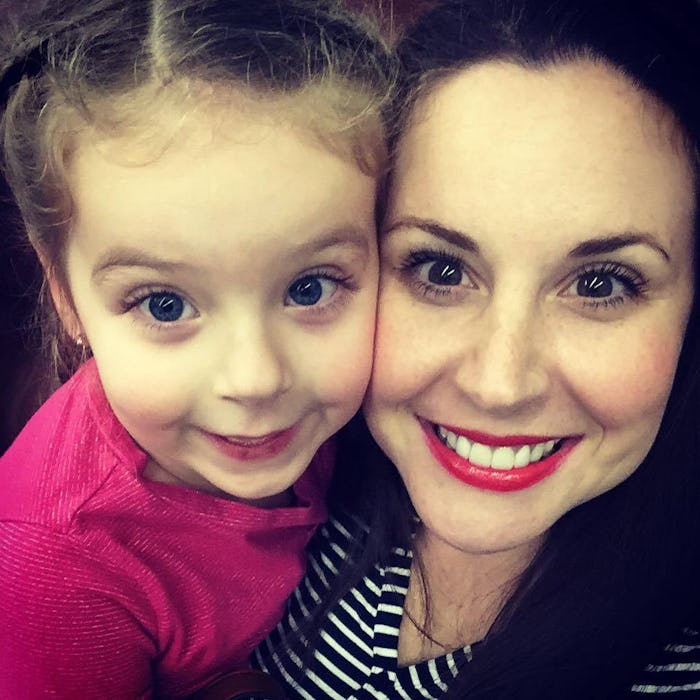Life

My Daughter Wants To Be A Mommy When She Grows Up — & That's Not OK
“I want to be just like you, mommy!”
When my daughter recently said those words, I was floored. I'm not particularly patient and I'm quick to lose my temper, so I don't consider myself a perfect parent. I was shocked that she wanted to be just like me, so I asked her to elaborate.
“I want to be a mommy," she said. "Just like you!”
“You mean be a mommy and something else, like a doctor or a writer or an artist, right?," I asked her.
“Nope," she said. "I just wanna have babies.”
At that moment, I felt like an enormous failure. Imitation may be the biggest form of flattery, but I was deeply dissatisfied with my daughter's answer. I'd expected more from her than just her desire to reproduce. What was I doing wrong that led my daughter to blindly equate womanhood with motherhood? Why did she want to be a mommy above all things?
This question proved difficult to unpack. It also led to even more questions: Why did the idea of her wanting to become a stay-at-home mom (SAHM) bother me so much? I’m a feminist who believes in the power of choice, and I'm a SAHM myself (albeit one who works from home). If my daughter wants to be a SAHM, doesn’t that make me a hypocrite for feeling disappointed by her choices? And how would I feel if my son expressed a similar sentiment?
To be clear, I don’t devalue mothers who are or want to be full-time parents. Raising children is thankless work, and it ought to be respected much more than it is. I know firsthand how much blood, sweat, and tears go into being a primary caregiver, because I spend the majority of my days with my kids. But I also consider myself much more than a mother. I’m a writer, a runner, a world traveler, a wife, a friend, and an activist.
Unfortunately, when you become a mother, it's very easy to allow your other identities to be subsumed by motherhood. When you are in charge of your children's lives, your own needs and wants can easily fall by the wayside. I should know; for my first few years as a mom, I was only a mom. I lost myself in my new role, ignoring my social life and the pursuit of my passions, and I became a shell of my former self.
My kids see a father who works long hours outside of the home and a mom who is almost always in the house, catering to their needs.
Perhaps my own lonely experience as a first-time mom drove my knee-jerk reaction to my daughter’s desire to have heaps of babies. She is spirited, intelligent, and fiercely independent, and I worry that the demands of motherhood would water her down. (Because let’s be honest: kids can do that to you, especially when you shoulder the brunt of parenting duties.)
But more acutely, my disappointment at her answer stems from the gendered roles I’ve unwittingly exposed my children to. While my husband and I make every effort to share household responsibilities (because men can do dishes and women can fix a broken toilet!), my kids see a father who works long hours outside of the home and a mom who is almost always in the house, catering to their needs. It’s no wonder my daughter thinks her adult life should be spent taking care of babies; it’s what she observes me doing on a daily basis.
On the flip side, I couldn’t help but wonder what my reaction would have been if my son had told me he aspired to be a stay-at-home dad. Would I have reacted as strongly? It’s highly unlikely. Such a declaration from him wouldn’t rub me the wrong way, simply because it doesn’t embody gender essentialism; it defies it. And regardless of my feminist credentials, I have internalized these gendered assumptions about what boys and girls are "supposed" to do just as much as anyone else has.
If my daughter chooses to have children, I hope she does so because she wants to, not because it’s what women “should” do.
I try my best to dismantle any gendered expectations my kids may have. I try to promote gender neutral toys and play, and I discourage hyper-masculinity and –femininity. But my daughter's answer indicates that I have my work cut out for me. I don’t ever want my daughter to believe her future exclusively depends on her ability to procreate. I likewise don’t want my son to conflate happiness with the ability to financially provide for his own family one day (should he choose to have one).
If my daughter chooses to have children, I hope she does so because she wants to, not because it’s what women “should” do. I want her to become a parent only after she is able to establish her own identity and understands that motherhood is but one component of it. And I want her to know that being a mom shouldn’t come at the expense of other joys of life.